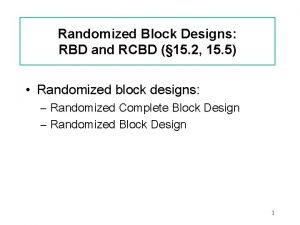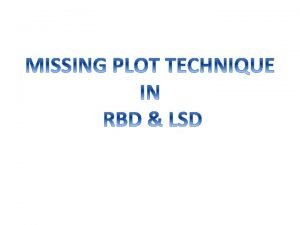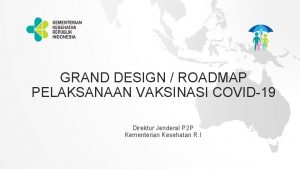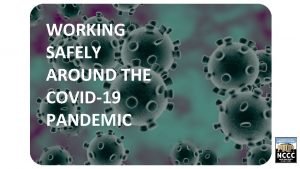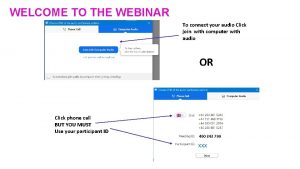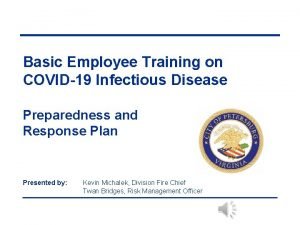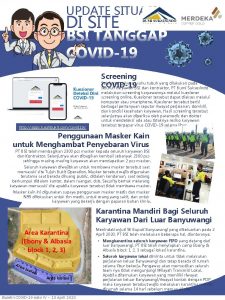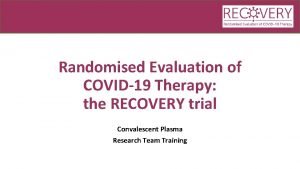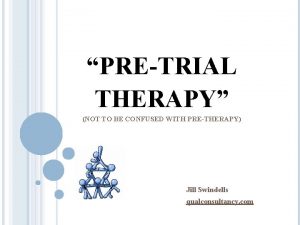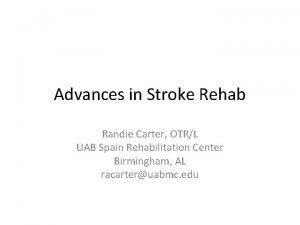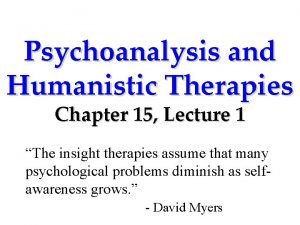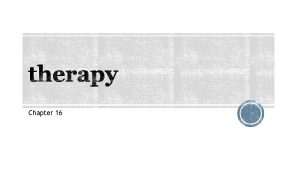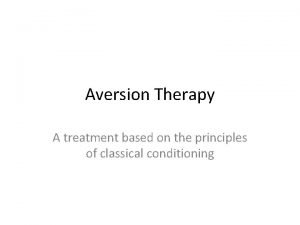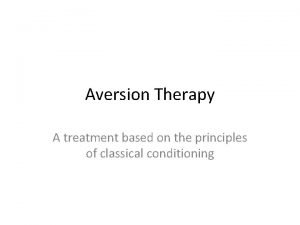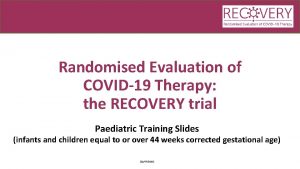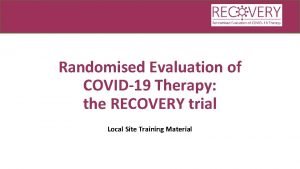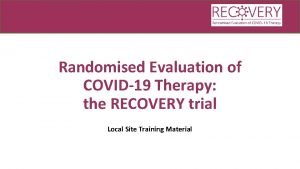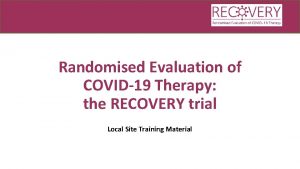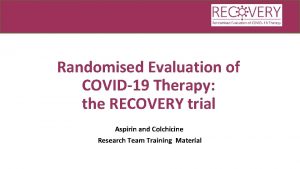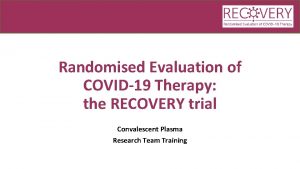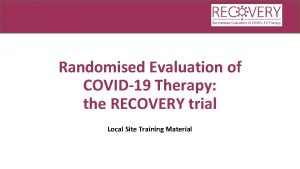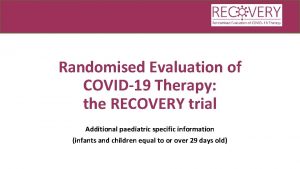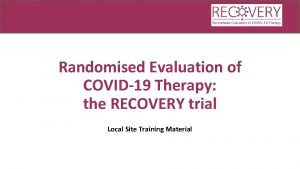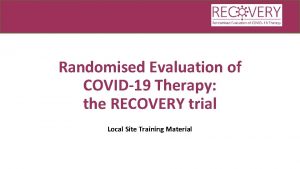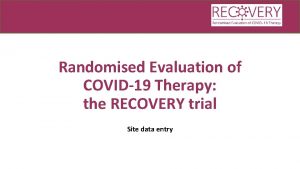Randomised Evaluation of COVID19 Therapy the RECOVERY trial















- Slides: 15

Randomised Evaluation of COVID-19 Therapy: the RECOVERY trial Synthetic monoclonal antibodies against SARS-Co. V-2 spike protein Research Team Training

SOC = Standard Of Care CP = Convalescent Plasma AZM = Azithromycin m. Ab = Monoclonal antibody R = Randomisation SOC + CP SOC + m. Ab SOC alone Tocilizumab R R 2 AZM + CP AZM + m. Ab AZM + SOC CP m. Ab SOC No additional treatment OUTCOMES ELIGIBLE PATIENTS Trial design

Protocol V 9. 0 • Several companies are now producing monoclonal antibodies (m. Abs) against SARS-Co. V-2 “spike” protein

Spike protein Human lung cell SARSCo. V-2 Spike protein ACE 2 receptor

Spike protein Human lung cell SARSCo. V-2 Spike protein ACE 2 receptor Infected human lung cell

Role of antibody Human lung cell SARSCo. V-2 Spike protein ACE 2 receptor

Role of antibody Human lung cell 1. Virus binding to its receptor is inhibited, so cells infected less readily SARSCo. V-2 Spike protein ACE 2 receptor 2. Antibody can activate other parts of immune system to kill infected cells and capture free virus

REGN-COV 2 • Most patients with Covid-19 will develop antibodies by day 14 • Convalescent plasma contains mixture of many different anti-coronavirus antibodies • Monoclonal antibodies have been developed which are 100% human, but only bind to one epitope on the spike protein • Two different antibodies mean that if virus mutates its spike protein such that one antibody doesn’t bind so well, the other antibody probably still will

Safety of REGN-COV 2 • REGN-COV 2 m. Ab has been given to ~600 patients so far in early phase trials • No serious adverse reactions • 4 patients have had minor infusion reactions which could be controlled symptomatically and infusion completed in 3/4 cases • Other trials ongoing in other clinical scenarios e. g. outpatient, prophylaxis

Pharmacy involvement • REGN-COV 2 will be provided in vials which need to be stored in temperature-monitored refrigerator between 2 -8 C • Stock control will use IWRS system which pharmacists will be given access to, but randomisation still done using main trial system • Pharmacy manual and other materials (eg, risk assessment) available on study website

Pharmacy involvement • If a participant is allocated REGN-COV 2, the necessary vials should be taken from refrigerator • IWRS system should be used to record allocation (and will also provide an expiry check – if IWRS indicates that treatment has expired it must not be used) • Pharmacy may prepare infusion depending on local policies

Safety data to date • To date, about 500 people have entered trials of REGN-COV 2 • No serious adverse reactions • 4 participants have experienced minor adverse reactions: • • • 1 x paraesthesiea 1 x urticaria, pruritus and flushing 1 x light-headedness, headache and vomiting 1 x abdominal pain All except one completed the infusion

Giving REGN-COV 2 • Infusion is made up in 250 m. L bag of 0. 9% saline and infused over 1 hour • Infusion reactions may occur and infusion should be stopped and reaction managed symptomatically • Bronchodilator for wheeze • Antihistamine/hydrocortisone for pruritus or rash • Infusion rate can be restarted at 50% previous rate if managing physician is satisfied it is reasonable to do so (not if reaction was severe)

Additional safety data collection • In first 72 hours after randomisation, has the participant had: • • • Sudden worsening in respiratory status Infusion reaction Temperature >39 o. C or ≥ 2 o. C rise above baseline Sudden hypotension (defined as either (i) sudden drop in systolic blood pressure of ≥ 30 mm. Hg with systolic blood pressure ≤ 80 mm. Hg; or (ii) requiring urgent medical attention) Clinical haemolysis (defined as fall in haemoglobin plus one or more of the following: rise in lactate dehydrogenase (LDH), rise in bilirubin, positive direct antiglobulin test (DAT), or positive crossmatch) • This information will be collected on additional Open. Clinica form • Data will be reviewed by DMC after first 200 participants and may not be required for all participants

Summary • REGN-COV 2 is being offered in a factorial randomisation at entry into RECOVERY • REGN-COV 2 is a combination of two monoclonal antibodies directed against SARS-Co. V-2 spike protein • At least first 200 participants in this randomisation will have extra safety information collected
 Rbd and rcbd
Rbd and rcbd Randomised block design
Randomised block design Vaksin covid19
Vaksin covid19 Do if you covid19
Do if you covid19 Covid19 athome rapid what know
Covid19 athome rapid what know What do if test positive covid19
What do if test positive covid19 Http://apps.tujuhbukit.com/covid19/
Http://apps.tujuhbukit.com/covid19/ Recovery trial training
Recovery trial training Pre trial therapy training
Pre trial therapy training Bioness integrated therapy system price
Bioness integrated therapy system price Humanistic therapies aim to boost
Humanistic therapies aim to boost Psychoanalytic vs humanistic
Psychoanalytic vs humanistic Aversion therapy evaluation
Aversion therapy evaluation Lewisville speech therapy evaluation
Lewisville speech therapy evaluation Evaluation of aversion therapy
Evaluation of aversion therapy Công thức tiính động năng
Công thức tiính động năng
